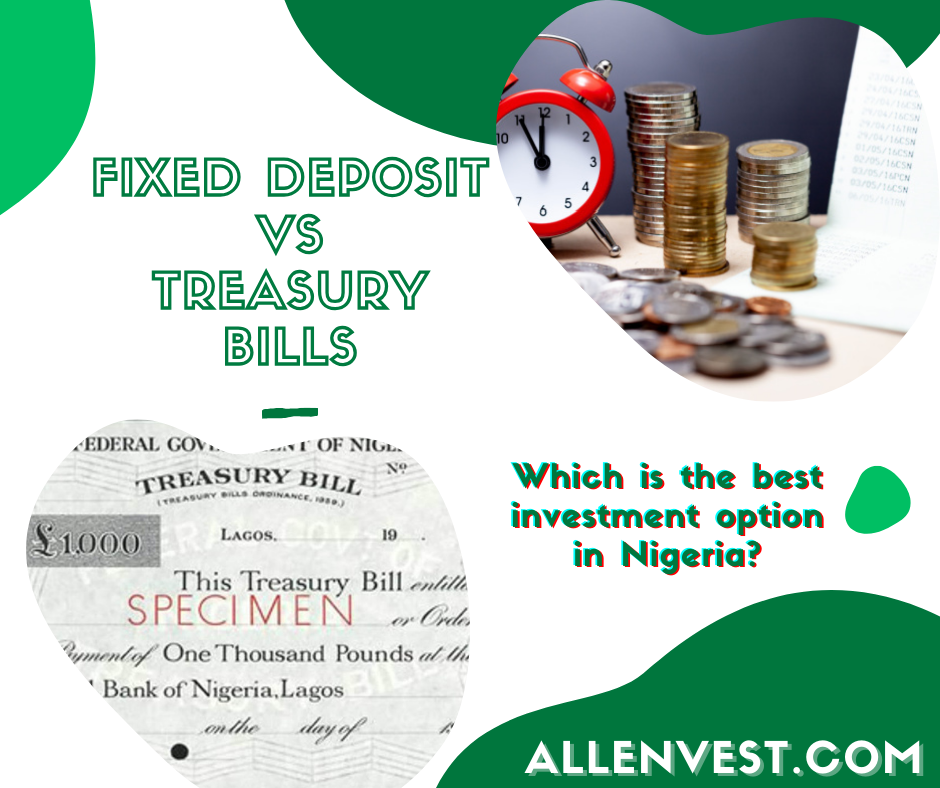
Are you looking for the best investment option in Nigeria? If so, then you must have come across fixed deposits and treasury bills. Both offer attractive opportunities for individuals and businesses to grow their money. But which one is better? In this article, we will compare fixed deposits vs treasury bills in Nigeria to help you make an informed decision.
We will analyze the pros and cons of fixed deposits and treasury bills, considering factors such as risk, return on investment, and liquidity. By the end, you will have a clear understanding of which option suits your investment goals and risk appetite.
What is a Fixed Deposit and How Does It Work in Nigeria?
Fixed deposits work by allowing you to earn interest on your savings while keeping your money safe and untouched for a set duration.
A fixed deposit is a type of savings account offered by banks in Nigeria where you deposit a specific amount of money for a fixed period of time at a fixed interest rate. During this period, you cannot withdraw the money without paying a penalty. The bank pays you interest on your deposit, which is usually higher than regular savings accounts.
Continue Reading
Fixed Deposit Accounts in Nigeria – Beginner’s Guide
What is a Treasury Bill and How Does It Work in Nigeria?
A Treasury Bill (T-Bill) is a short-term investment instrument issued by the Nigerian government through the Central Bank of Nigeria (CBN).
It works like a loan you give to the government for a specified period, usually ranging from 91 days to 365 days. In return, the government pays you back the amount when the T-Bill matures. Investors buy T-Bills at a discount to the face value and receive the full face value at maturity, making the difference their interest. T-Bills are considered safe investments because they are backed by the government.
Pros and Cons of Fixed Deposits
Pros of Fixed Deposits
1. Safety
Fixed deposits are considered safe investments because they are usually backed by banks, which are regulated by the government.
2. Predictable Returns
You know exactly how much interest you’ll earn at the end of the deposit period, making it easier to plan your finances.
3. Flexibility
You can choose the duration of your deposit, ranging from a few months to several years, based on your financial goals.
4. Low Risk
Compared to other investments like stocks or real estate, fixed deposits carry lower risk since they are not subject to market fluctuations.
Also Read
Fixed Deposit Interest Rates of the Top 8 Banks in Nigeria
Cons of Fixed Deposits
1. Lower Returns
Fixed deposit interest rates are typically lower than potential returns from riskier investments like stocks or mutual funds.
2. Lack of Liquidity
Once you invest in a fixed deposit, your money is locked in for the duration of the deposit period, and withdrawing it early may result in penalties or loss of interest.
3. Inflation Risk
The interest rate on your fixed deposit will not account for changes in inflation rate between the period of deposit and withdrawal. So if inflation were to increase within that period, your real returns may be negative, which means your purchasing power decreases over time.
4. Opportunity Cost
While your money is tied up in a fixed deposit, you may miss out on potential investment opportunities that offer higher returns.
Pros and Cons of Treasury Bills
Pros of Treasury Bills
1. Government Backing
Treasury bills are issued by the government, making them one of the safest investment options available.
2. Guaranteed Returns
Treasury bills offer fixed interest rates, ensuring that investors know exactly how much they will earn upon maturity.
3. Short-Term Investment
Treasury bills have short maturity periods, typically ranging from a few weeks to one year, providing investors with quick access to their funds.
4. Liquidity
Treasury bills can be easily bought and sold in the secondary market before maturity, offering investors liquidity when needed.
Cons of Treasury Bills
1. Lower Returns
Although Treasury bills are considered safe, their returns are generally lower compared to riskier investments like stocks or corporate bonds.
2. Interest Rate Risk
If interest rates rise after purchasing Treasury bills, the value of existing bills may decrease in the secondary market, resulting in capital losses for investors looking to sell before maturity.
3. Inflation Risk
If the interest rate on Treasury bills is lower than the inflation rate, investors may experience a decrease in purchasing power over time.
4. Lack of Long-Term Growth
Treasury bills are designed for short-term investment objectives and may not provide the same long-term growth potential as other investment options.
Comparison Table of Fixed Deposits vs Treasury Bills Side-by-side
| Aspect | Fixed Deposit | Treasury Bills |
|---|---|---|
| Definition | A savings account where money is held for a fixed period, earning a predetermined interest rate. | Short-term debt instruments issued by the government to raise funds from the public. |
| Issuer | Banks | Government |
| Maturity Period | Typically ranges from a few months to several years. | Usually ranges from a few weeks to one year. |
| Interest Rate | Fixed, determined at the time of deposit. | Fixed, determined by auction or set by the government. |
| Risk | Relatively low risk, especially with reputable banks. | Generally considered low risk due to government backing. |
| Returns | Typically higher than Treasury Bills, but lower than riskier investments like stocks. | Generally lower compared to Fixed Deposits, but higher than savings accounts. |
| Liquidity | Less liquid, with penalties for early withdrawal. | More liquid, can be sold in the secondary market before maturity. |
| Market Accessibility | Limited to the bank where the deposit is made. | Can be bought and sold in the secondary market. |
| Purpose | Suitable for individuals and organizations looking for stable returns over a longer period. | Suitable for investors seeking short-term, low-risk investment options. |
| Taxation | Interest earned may be subject to tax. | Interest earned may be subject to tax. |
Fixed Deposits vs Treasury Bills in Nigeria: Which is better?
If you prefer steady returns over a longer period and are willing to lock in your money for a specific duration, then a Fixed Deposit might be better suited for you. It’s ideal for individuals or businesses seeking stable returns with relatively low risk.
On the other hand, if you’re looking for short-term investment options with a lower risk profile and the flexibility to buy and sell in the market, Treasury Bills could be a better choice. They are suitable for investors who prioritize liquidity and prefer shorter investment horizons.
Ultimately, the decision depends on your investment objectives, risk appetite, and the duration you’re willing to commit your funds. It’s advisable to consult with a financial advisor to determine the best option based on your individual circumstances.
Frequently Asked Questions on Fixed Deposits vs Treasury Bills in Nigeria
1. What is the difference between a fixed deposit and Treasury bills in Nigeria today?
Fixed deposits are savings accounts where money is deposited for a specific period at a fixed interest rate, while Treasury bills are short-term debt securities issued by the Nigerian government to raise funds for short-term expenditures.
2. Is Treasury Bill a Good Investment in Nigeria?
Treasury bills can be a good investment for those seeking low-risk options with a short investment horizon and a desire for liquidity.
3. Which is better, Fixed Deposit or Treasury Bills?
The choice between Fixed Deposit and Treasury Bills depends on your investment goals, risk tolerance, and liquidity needs.
4. What are the disadvantages of investing in Treasury bills?
One disadvantage of investing in Treasury bills is that the returns may be lower compared to other investment options, especially during periods of low-interest rates.
5. What is the disadvantage of fixed deposit account in Nigeria?
A disadvantage of fixed deposit accounts in Nigeria is that the interest rates offered may not keep up with inflation, leading to a decrease in the purchasing power of the returns.
6. Are Treasury Bills a Good Investment?
Treasury bills can be considered a good investment for those seeking stability and safety, as they are backed by the government and have low default risk.
7. What is a better investment than Treasury bills?
Depending on your risk appetite and investment goals, other options such as stocks, mutual funds, or real estate may offer better returns over the long term.
8. Which is better bonds or fixed deposits?
Bonds and fixed deposits are both debt instruments, but bonds are typically issued by corporations or governments and may offer higher returns with varying levels of risk, while fixed deposits provide guaranteed returns but at lower interest rates.
Our telegram group is now open to the public. Get instant access to the latest blog posts, updates, exclusive content, and valuable insights on banking, investing, and financial planning.
Stay connected with us for a brighter financial future.


Pingback: Fixed Deposit Interest Rates of the Top 8 Banks in Nigeria - AllenVest.com
Pingback: Fixed Deposit Accounts in Nigeria - Beginner's Guide - AllenVest.com